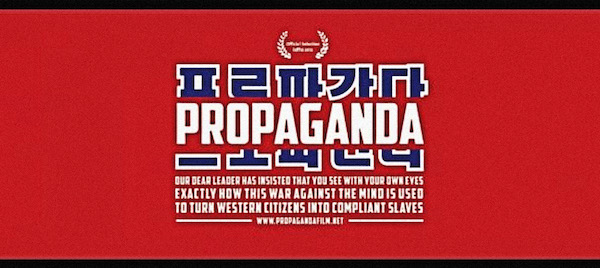In 2012 a YouTube user named Sabine started uploading a film in 10-minute segments. The story went that while on a visit to North Korea, a dissident had slipped Sabine a DVD of a propaganda movie that was showing on North Korean state television. The idea of such a film seemed logical. It would have been made while Kim Jong il was still alive. He had prioritized film as a means of promoting the North Korean Juche spirit. (he famously kidnapped a Japanese director and his wife for this purpose in 1978). The film was a sophisticated collage of western images, sorted into categories that included “Rewriting History”, “Complicity” and “The Cult of Celebrity.” Lurid images of life in the West were accompanied by quotes from Noam Chomsky, Richard Dawkins, Charles Manson and numerous other figures whom it seemed odd that North Korean state media were so aware of. The film was narrated by a North Korean psychologist, whose calm musings made the western images seem even more chaotic. Paragraphs of Korean text floating over the images further confirmed the veracity of this “found” film. A cult had developed around the film that had much of the obsessive attention to detail that is usually reserved for Star Wars fans. As Sabine was translating the Korean footage as fast as possible, the ten-minute chunks came erratically, causing extra speculation, and increasing the fervor of anticipation.
As the real story leaked out, the whole enterprise became even more jaw-dropping. It turns out that the filmmaker behind this project was a New Zealand prankster who was operating in a space somewhere between conceptual art and viral marketing. When Slavko Martinov revealed that he was the director, things got even more weird. A sort of denial set in among aficionados, who kept arguing about North Korea’s intentions. As the director points out, a film about propaganda would be “dry as a bone”, so they needed an angle to generate excitement. Once the excitement was generated and the theories were formed, people had a lot invested in its “authenticity.”
One of the things that makes the most convincing case for the film’s authenticity is the amount of found footage of brand name-everything that they use. Surely a western filmmaker would be terrified of lawsuits.
The filmmaker did check with a copyright attorney about fair use before he rolled those dice. In an interview preceding the film’s screening at two film festivals (most film festivals wouldn’t touch it), Slavko admits that a lawsuit by somebody like Paris Hilton or Tyra Banks (both shown at their worst in the found footage) would generate publicity beyond their very meager budget.
The key collateral damage of the film is the actor who played the North Korean psychologist. He has been ostracized globally by the South Korean community. Meanwhile, the copy sent to the official North Korean media was warmly welcomed, and is now used as propaganda. The whole thing is incredibly meta. A film about propaganda, pretending to be propaganda, used as propaganda, becomes a multilayered work of conceptual art.


